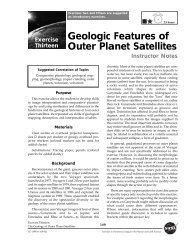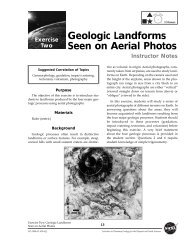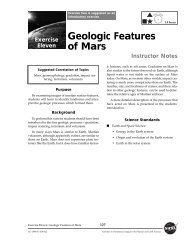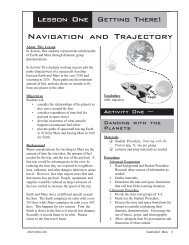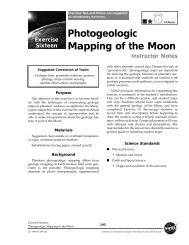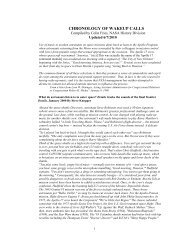- Page 1 and 2:
PREPUBLICATION COPY Subject to Furt
- Page 3 and 4:
The National Academy of Sciences is
- Page 5 and 6:
COMMITTEE ON THE PLANETARY SCIENCE
- Page 7 and 8:
STAFF DAVID H. SMITH, Senior Progra
- Page 9 and 10:
Preface Strategic planning activiti
- Page 11 and 12:
statement of task’s call for “i
- Page 13 and 14:
Understand the Processes That Contr
- Page 15 and 16:
Executive Summary In recent years,
- Page 17 and 18:
however, that the Discovery program
- Page 19 and 20:
• Jupiter Europa Orbiter (descope
- Page 21 and 22:
TABLE ES.2 Medium Class Missions—
- Page 23 and 24:
Summary This report was requested b
- Page 25 and 26:
• Recent volcanic activity on Ven
- Page 27 and 28: Mission Study Process and Technical
- Page 29 and 30: Near the end of the past decade, NA
- Page 31 and 32: • Mars Astrobiology Explorer-Cach
- Page 33 and 34: development, and descoped or cancel
- Page 35 and 36: Plausible circumstances could impro
- Page 37 and 38: Data Distribution and Archiving Dat
- Page 39 and 40: Sample curation facilities are crit
- Page 41 and 42: consider making equivalent systems
- Page 43 and 44: committee concluded that for the mo
- Page 45 and 46: alanced ground-based solar astronom
- Page 47 and 48: 1 Introduction to Planetary Science
- Page 49 and 50: THE 2002 SOLAR SYSTEM EXPLORATION D
- Page 51 and 52: Medium The first decadal survey ide
- Page 53 and 54: FIGURE 1.6 Victoria crater as image
- Page 55 and 56: FIGURE 1.8 The mirror for the Large
- Page 57 and 58: FIGURE 1.10 From a comet, to the de
- Page 59 and 60: • The committee’s programmatic
- Page 61 and 62: • Opportunities for joint venture
- Page 63 and 64: FIGURE 1.14 Schematic showing the f
- Page 65 and 66: 2 National and International Progra
- Page 67 and 68: FIGURE 2.3 Sand dunes on Mars photo
- Page 69 and 70: NASA’s Earth Science Division Pla
- Page 71 and 72: More recently, among the goals of t
- Page 73 and 74: FIGURE 2.6 A natural bridge on the
- Page 75 and 76: investigations should still be deve
- Page 77: FIGURE 2.10 The surface of Titan as
- Page 81 and 82: 3 Priority Questions in Planetary S
- Page 83 and 84: • How have the myriad chemical an
- Page 85 and 86: How Did the Giant Planets and Their
- Page 87 and 88: heavy bombardment? Clues to address
- Page 89 and 90: Did Mars or Venus Host Ancient Aque
- Page 91 and 92: We lack critical geophysical data a
- Page 93 and 94: detected in time. The report conclu
- Page 95 and 96: How Have the Myriad of Chemical and
- Page 97 and 98: 13. P.R. Estrada, I. Mosqueira, J.J
- Page 99 and 100: 51. M.J. Mumma, G.L. Villanueva, R.
- Page 101 and 102: 4 The Primitive Bodies: Building Bl
- Page 103 and 104: FIGURE 4.1 Asteroids and comet nucl
- Page 105 and 106: • How do the compositions of pres
- Page 107 and 108: Future Directions for Investigation
- Page 109 and 110: Astrobiology is the study of the or
- Page 111 and 112: Important Questions Some important
- Page 113 and 114: observations of the outer parts of
- Page 115 and 116: Sample Curation and Laboratory Faci
- Page 117 and 118: In the previous decadal survey, CCS
- Page 119 and 120: asteroid (either ice-rock or metal-
- Page 121 and 122: hazard. Asteroid 433 Eros, one of t
- Page 123 and 124: BOX 4.1 The Discovery Program, Vita
- Page 125 and 126: ody exploration can be achieved by
- Page 127 and 128: 34. H.H. Hsieh and D. Jewitt. 2006.
- Page 129 and 130:
FIGURE 5.1 Mercury, Venus, and the
- Page 131 and 132:
Constrain the Bulk Composition of t
- Page 133 and 134:
from Venus Express and Galileo may
- Page 135 and 136:
• Understand the composition and
- Page 137 and 138:
• Is there evidence of environmen
- Page 139 and 140:
Important Questions Some important
- Page 141 and 142:
timescales, including the possible
- Page 143 and 144:
that may have fostered life, there
- Page 145 and 146:
• Venus In Situ Explorer • Sout
- Page 147 and 148:
FIGURE 5.3 Venus’s climate is con
- Page 149 and 150:
Important scientific objectives tha
- Page 151 and 152:
BOX 5.1 Planetary Roadmaps Roadmaps
- Page 153 and 154:
4. D.J. Lawrence, W.C. Feldman, J.O
- Page 155 and 156:
6 Mars: Evolution of an Earth-like
- Page 157 and 158:
BOX 6.1 Mars Science Laboratory Sch
- Page 159 and 160:
live there now?”—both key compo
- Page 161 and 162:
characteristics (water, gradients i
- Page 163 and 164:
availability, physicochemical facto
- Page 165 and 166:
UNDERSTAND THE PROCESSES AND HISTOR
- Page 167 and 168:
FIGURE 6.4 Examples of recent clima
- Page 169 and 170:
particularly the polar-layered depo
- Page 171 and 172:
FIGURE 6.6 Geologic time sequence o
- Page 173 and 174:
Future Directions for Investigation
- Page 175 and 176:
planets and for understanding subse
- Page 177 and 178:
experiments, compounded by the unce
- Page 179 and 180:
Curation Martian samples require sc
- Page 181 and 182:
particle sizes, wavelength ranges,
- Page 183 and 184:
environmental conditions including
- Page 185 and 186:
Mars Polar Climate Mission As a fol
- Page 187 and 188:
R.E. Arvidson, C.C. Allen, D.J. Des
- Page 189 and 190:
27. J. Grotzinger, J.F. Bell III, W
- Page 191 and 192:
B.M. Jakosky and R.J. Phillips. 200
- Page 193 and 194:
72. White papers received by decada
- Page 195 and 196:
(MRR-SAG). Posted by the Mars Explo
- Page 197 and 198:
the solar system formed. Understand
- Page 199 and 200:
FIGURE 7.2 Left: This Hubble image
- Page 201 and 202:
temperatures, helium is enhanced in
- Page 203 and 204:
FIGURE 7.4 The intrinsic specific l
- Page 205 and 206:
Investigate the Chemistry of Giant
- Page 207 and 208:
Jupiters seen around other stars in
- Page 209 and 210:
• What causes the enormous differ
- Page 211 and 212:
FIGURE 7.5 Top: This composite comp
- Page 213 and 214:
EXPLORING THE GIANT PLANET’S ROLE
- Page 215 and 216:
destroy areas of land equivalent to
- Page 217 and 218:
• Assess tidal evolution within g
- Page 219 and 220:
• What processes drive the visibl
- Page 221 and 222:
esolution visible and near-infrared
- Page 223 and 224:
INTERCONNECTIONS Links to Other Par
- Page 225 and 226:
SUPPORTING RESEARCH AND RELATED ACT
- Page 227 and 228:
FIGURE 7.10 Our atmosphere blocks l
- Page 229 and 230:
Cassini Solstice Mission ADVANCING
- Page 231 and 232:
8. Determine the composition, struc
- Page 233 and 234:
Summary To achieve the primary goal
- Page 235 and 236:
Outer Solar System; William B. McKi
- Page 237 and 238:
54. White papers received by decada
- Page 239 and 240:
92. White papers received by decada
- Page 241 and 242:
TABLE 8.1 Characteristics of the La
- Page 243 and 244:
organisms live there now?” Titan
- Page 245 and 246:
• Why are Titan and Callisto appa
- Page 247 and 248:
Callisto but unlike Ganymede. This
- Page 249 and 250:
valuable window into solar system h
- Page 251 and 252:
Future Directions for Investigation
- Page 253 and 254:
FIGURE 8.6 Multiple jets, dominated
- Page 255 and 256:
FIGURE 8.8 Schematic of the complex
- Page 257 and 258:
orbits of Io and Europa), and poten
- Page 259 and 260:
Cassini has revealed that most of t
- Page 261 and 262:
satellite interiors should include
- Page 263 and 264:
Future Directions for Investigation
- Page 265 and 266:
hardened technology for Io and Gany
- Page 267 and 268:
FIGURE 8.11 After a comprehensive t
- Page 269 and 270:
FIGURE 8.12 Galileo color image of
- Page 271 and 272:
Titan Saturn System Mission Many Ti
- Page 273 and 274:
1. What is the nature of Enceladus
- Page 275 and 276:
the majority of the Jupiter Europa
- Page 277 and 278:
7. O. Mousis, J.I. Lunine, M. Pasek
- Page 279 and 280:
45. K.K. Khurana, M.G. Kivelson, K.
- Page 281 and 282:
9 Recommended Flight Investigations
- Page 283 and 284:
All of the recommendations below ar
- Page 285 and 286:
As discussed in more detail below,
- Page 287 and 288:
• Ensure that there are adequate
- Page 289 and 290:
TABLE 9.2 Discovery Program Mission
- Page 291 and 292:
overarching questions in Chapter 3.
- Page 293 and 294:
These five were selected from the s
- Page 295 and 296:
The Mars community, in their inputs
- Page 297 and 298:
should immediately undertake an eff
- Page 299 and 300:
(a) (b) FIGURE 9.1 Notional funding
- Page 301 and 302:
As noted, the recommended and cost-
- Page 303 and 304:
described above are the existing De
- Page 305 and 306:
The projected need decreased from 2
- Page 307 and 308:
partnership with the Department of
- Page 309 and 310:
10 Planetary Science Research and I
- Page 311 and 312:
Through the direct involvement of s
- Page 313 and 314:
Theoretical development and numeric
- Page 315 and 316:
Defining the Need Jon Miller, in hi
- Page 317 and 318:
efforts, can help assure compatibil
- Page 319 and 320:
history. And telescopic observation
- Page 321 and 322:
Hubble Space Telescope Hubble obser
- Page 323 and 324:
Although Ka-band downlink has a cle
- Page 325 and 326:
and Planetary Institute. Currently,
- Page 327 and 328:
the Green Bank Telescope (GBT), and
- Page 329 and 330:
up observations. Likewise, monitori
- Page 331 and 332:
11 The Role of Technology Developme
- Page 333 and 334:
particular technology item. In gene
- Page 335 and 336:
The Requirement for Power Of all th
- Page 337 and 338:
proposals and populated by technolo
- Page 339 and 340:
TABLE 11.1 Summary of Types of Miss
- Page 341 and 342:
Solar System Access and Other Core
- Page 343 and 344:
influence on the planetary science
- Page 346 and 347:
A Letter of Request and Statement o
- Page 348 and 349:
latter topics are treated in the NR
- Page 350 and 351:
main findings and recommendations s
- Page 352 and 353:
TABLE B.1 Institutional Distributio
- Page 354 and 355:
M. Gudipati, Laboratory Studies for
- Page 356 and 357:
Scott A. Sandford, The Comet Coma R
- Page 358 and 359:
C Cost and Technical Evaluation of
- Page 360 and 361:
were all full mission studies selec
- Page 362 and 363:
Schedule To aid in the assessment o
- Page 364 and 365:
FIGURE C.3 Complexity Based Risk As
- Page 366 and 367:
Lunar Lander Network⎯Four Landers
- Page 368 and 369:
Caching Mars Rover Mars Astrobiolog
- Page 370 and 371:
Mars Sample Return Lander and Mars
- Page 372 and 373:
Flagship‐class Europa Orbiter SOU
- Page 374 and 375:
Saturn Atmospheric Entry Probe SOUR
- Page 376 and 377:
Enceladus Orbiter Spacecraft SOURCE
- Page 378 and 379:
Uranus Orbiter with Entry Probe SOU
- Page 380 and 381:
SUMMARY Linked technical, cost, and
- Page 382 and 383:
Overview The purpose of this rapid
- Page 384 and 385:
Conclusions Based on analyses of th
- Page 386 and 387:
Technology development was found to
- Page 388 and 389:
• Characterize the local meteorol
- Page 390 and 391:
• Characterize Ganymede’s uniqu
- Page 392 and 393:
landing in the small southern lakes
- Page 394 and 395:
atmospheric probe and another a sep
- Page 396 and 397:
FIGURE E.1 Projected budget for the
- Page 398 and 399:
Biosphere: The life zone of Earth o
- Page 400 and 401:
EPOXI: The name of the extended mis
- Page 402 and 403:
Late heavy bombardment: A postulate
- Page 404 and 405:
Nili Fossae region: A fracture in t
- Page 406 and 407:
Protoplanet: A planet in the proces
- Page 408 and 409:
Stardust: A spacecraft launched in
- Page 410:
G Mission and Technology Study Repo



